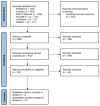Interventions to Reduce COVID-19 Vaccine Hesitancy among Black and African American Individuals in the United States: A Systematic Literature Review
- PMID: 39339991
- PMCID: PMC11435803
- DOI: 10.3390/vaccines12090959
Interventions to Reduce COVID-19 Vaccine Hesitancy among Black and African American Individuals in the United States: A Systematic Literature Review
Abstract
COVID-19 vaccine hesitancy had major implications for racial health equity at the beginning of the vaccination campaign in the U.S. Interventions to reduce vaccine hesitancy among Black and African American individuals partially helped to reduce vaccine hesitancy in specific communities. This article describes findings on interventions to reduce COVID-19 vaccine hesitancy among Black and African American individuals from a literature review we conducted. We found 12 studies that described communication, partnerships, and distribution interventions. Regarding communication, examples include a webinar hosted by an academic-community partnership team, information sessions, social media campaigns, educational materials, and virtual town halls. Effective partnerships identified through this literature review were a statewide alliance and one between an academic institution and faith and community leaders. Distribution interventions identified through the literature review were the deployment of multiple tactics to increase COVID-19 vaccine uptake (virtual town halls, a confidential employee hotline, department huddles, written educational material, and accessible vaccination stations) and offering to administer the COVID-19 vaccine during medical appointments. The results of this review show that implementing interventions directed at specific minority groups improves COVID-19 vaccine acceptance without undermining overall vaccine distribution or uptake.
Keywords: African American; Black; COVID-19; interventions; vaccine hesitancy.
Conflict of interest statement
The authors declare no conflicts of interest. The funder had no role in the design of the study; in the collection, analyses, or interpretation of data; in the writing of the manuscript; or in the decision to publish the results.
Figures
Similar articles
-
Determinants of Vaccine Hesitancy among African American and Black Individuals in the United States of America: A Systematic Literature Review.Vaccines (Basel). 2024 Mar 7;12(3):277. doi: 10.3390/vaccines12030277. Vaccines (Basel). 2024. PMID: 38543911 Free PMC article. Review.
-
Virtual town halls addressing vaccine hesitancy among racial/ethnic minorities: Preliminary findings.J Am Pharm Assoc (2003). 2022 Jan-Feb;62(1):317-325. doi: 10.1016/j.japh.2021.11.005. Epub 2021 Nov 10. J Am Pharm Assoc (2003). 2022. PMID: 34996576 Free PMC article.
-
Narratives from African American/Black, American Indian/Alaska Native, and Hispanic/Latinx community members in Arizona to enhance COVID-19 vaccine and vaccination uptake.J Behav Med. 2023 Apr;46(1-2):140-152. doi: 10.1007/s10865-022-00300-x. Epub 2022 Mar 24. J Behav Med. 2023. PMID: 35322313 Free PMC article.
-
The Past Is so Present: Understanding COVID-19 Vaccine Hesitancy Among African American Adults Using Qualitative Data.J Racial Ethn Health Disparities. 2023 Feb;10(1):462-474. doi: 10.1007/s40615-022-01236-3. Epub 2022 Feb 19. J Racial Ethn Health Disparities. 2023. PMID: 35182372 Free PMC article.
-
COVID-19 vaccination hesitancy in Hispanics and African-Americans: A review and recommendations for practice.Brain Behav Immun Health. 2021 Aug;15:100277. doi: 10.1016/j.bbih.2021.100277. Epub 2021 May 21. Brain Behav Immun Health. 2021. PMID: 34036287 Free PMC article. Review.
References
-
- Konow J. Which is the fairest one of all? A positive analysis of justice theories. J. Econ. Lit. 2003;41:1188–1239. doi: 10.1257/002205103771800013. - DOI
-
- Schroeder D., Pisupati B. Ethics, Justice and the Convention on Biological Diversity. United Nations Environment Programme; Nairobi, Kenya: 2010. [(accessed on 27 April 2024)]. Available online: https://www.unep.org/resources/report/ethics-justice-and-convention-biol....
-
- Finucane M.L., May L.W., Chang J. A Scoping Literature Review on Indicators and Metrics for Assessing Racial Equity in Disaster Preparation, Response, and Recovery. RAND Corporation; Santa Monica, CA, USA: 2021. [(accessed on 23 April 2024)]. Available online: https://www.rand.org/pubs/research_reports/RRA1083-1.html.
-
- McDermott M., Mahanty S., Schreckenberg K. Examining equity: A multidimensional framework for assessing equity in payments for Ecosystem Services. Environ. Sci. Policy. 2013;33:416–427. doi: 10.1016/j.envsci.2012.10.006. - DOI
-
- Sen A. Inequality Reexamined. Russell Sage Foundation; New York, NY, USA: Clarendon Press; Oxford, UK: 1995.
Publication types
Grants and funding
LinkOut - more resources
Full Text Sources


